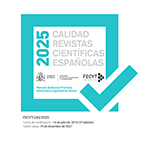El andamiaje metacognitivo en contextos de aprendizaje de una lengua extranjera
Abstract
The purposes of the present study are: (1) To describe the Metacognitive Loop Model which explains the role of metacognition in the self-regulation of knowledge; (2) To point out metacognitive strategies used by foreign language (FL) students; (3) To propose activities for scaffolding and induction of metacognitive processes in the FL classroom. A theoretical and bibliographic research is carried out from a rationalist epistemological perspective, incorporating the valuable results of FL teaching and research experience. The Metacognitive Loop Model is described as the interface between a cycle of dependence and one of accountability. Results point out the analogies between metacognitive strategies (Oxford, 1990) and the stages of the writing process (Cassany, 1999). We conclude that metacognitive training supports and complements the development of FL strategies and skills, and that metacognitive induction strategies should be entwined in the general process of target language development. Instruments are provided for metacognitive induction in FL classes.Downloads
Article download
License
In order to support the global exchange of knowledge, the journal Didáctica. Lengua y Literatura is allowing unrestricted access to its content as from its publication in this electronic edition, and as such it is an open-access journal. The originals published in this journal are the property of the Complutense University of Madrid and any reproduction thereof in full or in part must cite the source. All content is distributed under a Creative Commons Attribution 4.0 use and distribution licence (CC BY 4.0). This circumstance must be expressly stated in these terms where necessary. You can view the summary and the complete legal text of the licence.










